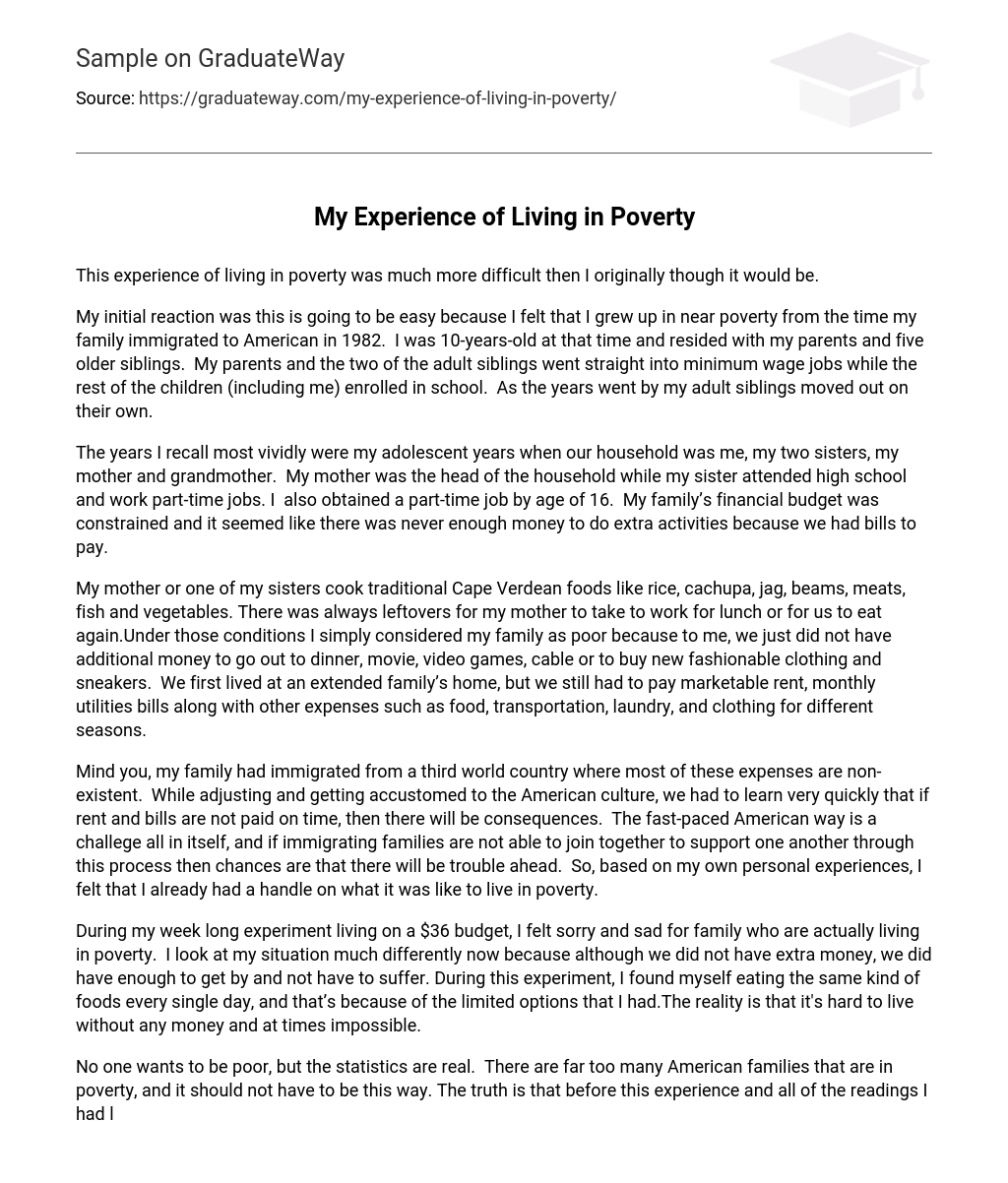This experience of living in poverty was much more difficult then I originally though it would be.
My initial reaction was this is going to be easy because I felt that I grew up in near poverty from the time my family immigrated to American in 1982. I was 10-years-old at that time and resided with my parents and five older siblings. My parents and the two of the adult siblings went straight into minimum wage jobs while the rest of the children (including me) enrolled in school. As the years went by my adult siblings moved out on their own.
The years I recall most vividly were my adolescent years when our household was me, my two sisters, my mother and grandmother. My mother was the head of the household while my sister attended high school and work part-time jobs. I also obtained a part-time job by age of 16. My family’s financial budget was constrained and it seemed like there was never enough money to do extra activities because we had bills to pay.
My mother or one of my sisters cook traditional Cape Verdean foods like rice, cachupa, jag, beams, meats, fish and vegetables. There was always leftovers for my mother to take to work for lunch or for us to eat again.Under those conditions I simply considered my family as poor because to me, we just did not have additional money to go out to dinner, movie, video games, cable or to buy new fashionable clothing and sneakers. We first lived at an extended family’s home, but we still had to pay marketable rent, monthly utilities bills along with other expenses such as food, transportation, laundry, and clothing for different seasons.
Mind you, my family had immigrated from a third world country where most of these expenses are non-existent. While adjusting and getting accustomed to the American culture, we had to learn very quickly that if rent and bills are not paid on time, then there will be consequences. The fast-paced American way is a challege all in itself, and if immigrating families are not able to join together to support one another through this process then chances are that there will be trouble ahead. So, based on my own personal experiences, I felt that I already had a handle on what it was like to live in poverty.
During my week long experiment living on a $36 budget, I felt sorry and sad for family who are actually living in poverty. I look at my situation much differently now because although we did not have extra money, we did have enough to get by and not have to suffer. During this experiment, I found myself eating the same kind of foods every single day, and that’s because of the limited options that I had.The reality is that it’s hard to live without any money and at times impossible.
No one wants to be poor, but the statistics are real. There are far too many American families that are in poverty, and it should not have to be this way. The truth is that before this experience and all of the readings I had little understanding of the day-to-day realities of living in poverty. The way I see it is that society often lacks compassion and understanding of the feelings of poor families around them.
If society as a whole starts to better understand what it’s really like to be poor, then maybe begin to pull together to advocate and rally for changes. Our society most let go the old stigma that all poor families or people are non-educated, mentally ill, substance abusers or any of the other commonly used stereotypes. The general public needs to put more effort and research the real reasons why more then ever Americans families are in poverty. We have to try to understand the constant pressure and stress that a family in poverty is under because they do not have enough money to survive.
It is very difficult, scary and overwhelming being poor.My experiment of living in poverty has opened my eyes to the realities of living in poverty day in and day out. If more people could experience this, I believe it would lead people to more compassion. It is no wonder that people in poverty have a higher percentage of health problems due to the limited food choices.
Cheap food is not healthy food. Think about how much a salad costs in comparison with a burger. Again, this experience really opened my eyes. And yet, I realize that there is so much that I still don’t know because I only lived this for a week.
There are people in this country who live this for a lifetime.;Living on a poverty budget for one week. Reaction Paper due at the 7th Session.Each student will plan a food budget that is equivalent to the value of food stamps for which one individual eligible for welfare assistance may claim.
The student will shop for groceries, or alternatively eat carry-out meals that permit him/her to live within the food stamp limit for the duration of this 7 day learning experience. Careful journals should be kept of daily food expenditures, approximate quantity and type of food ingested, and subjective experiences connected with this learning assignment. Any students who are unable to fully comply with this learning assignment due to a current health condition should keep a record of the extent of financial supplementation of the food stamp budget that is necessary in order to ingest the amount or type of food consistent with their health needs. Supplementation of the food stamp budget may be recorded in percentage terms (e.
g. – 150 % over the food stamp budget for the week). Regardless of health issues, students should keep careful journals on daily intake, expenses, and subjective experience of shopping for foods that fit roughly within the parameters of the food stamp diet.;





